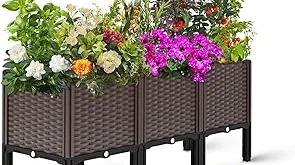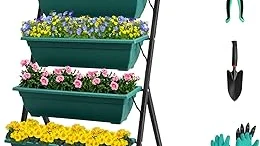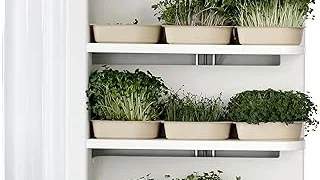To grow healthy plants, knowing your soil's pH is crucial. The right pH balance ensures your plants get the nutrients they need.
Gardeners and farmers often ask about the best pH testers for soil. This is because soil pH affects plant health and growth. A good pH tester helps you monitor and adjust your soil's acidity or alkalinity. With many options available, finding the right tester can be tricky.
In this guide, we explore the best pH testers for soil. We consider accuracy, ease of use, and reliability. Whether you have a small garden or a large farm, the right pH tester will make a big difference. Let's dive in and find the best tools to help your plants thrive.
Introduction To Soil Ph Testing
Understanding soil pH is crucial for gardeners and farmers. Soil pH affects plant growth, nutrient availability, and soil health. Testing soil pH helps determine if the soil is acidic, neutral, or alkaline. Knowing the pH level guides soil amendments and fertilization.
Importance Of Soil Ph
Soil pH influences plant growth. Certain plants thrive in specific pH levels. For instance, blueberries prefer acidic soil. Soil pH impacts nutrient absorption. Nutrients are more available at certain pH levels. Low or high pH can lock essential nutrients. Balanced pH prevents plant stress and disease.
Benefits Of Accurate Testing
Accurate soil pH testing aids effective gardening. It reveals the true condition of your soil. Accurate results guide precise soil amendments. This saves money and resources. Proper pH levels increase crop yields. Healthy plants result in abundant harvests. Testing ensures informed decisions and successful planting.
Types Of Ph Testers
Understanding the types of pH testers can help you choose wisely. Soil pH testers vary in technology, cost, and ease of use. Each type has its own benefits for different gardening needs. Below, we explore the most common types of pH testers.
Digital Ph Meters
Digital pH meters offer precise readings. They display results on a digital screen. These meters work by inserting a probe into the soil. Results appear quickly, often in seconds. This makes them ideal for frequent testing. Many digital meters also measure soil moisture. They run on batteries, which need regular replacement. Calibration is necessary for accurate results. This involves using special solutions.
Analog Ph Testers
Analog pH testers provide a simple, mechanical way to test soil. These testers use a needle to show pH levels. No batteries are needed, making them low-maintenance. Insert the probe into the soil for results. The needle moves to display the pH level. This type is usually more affordable than digital meters. It is also less fragile, ideal for outdoor use. Analog testers do not require calibration. However, they may not be as precise as digital meters.
Features To Consider
Choosing the best pH tester for soil can seem challenging. Understanding the key features can simplify your decision. Focus on the features that matter most. These features ensure accurate readings and ease of use. Let’s explore what to consider when selecting a soil pH tester.
Accuracy And Precision
Accuracy is crucial in a soil pH tester. Look for testers with high precision. Ensure they provide consistent results. A reliable tester should measure pH levels accurately. This helps in understanding soil health. Consistent readings support better gardening decisions. Check for testers with a proven track record of accuracy.
Ease Of Use
Ease of use is vital for a pH tester. A simple design helps in daily tasks. Look for testers with clear instructions. Easy-to-read displays are important. Consider testers that are lightweight and portable. These features make testing soil hassle-free. User-friendly testers save time and effort.
Top Digital Ph Testers
Are you tired of guessing whether your soil has the right pH balance for your plants? Digital pH testers can be a game changer for your gardening efforts. These handy devices offer precision and ease of use, ensuring your plants thrive in their optimal environment. Whether you're an experienced gardener or just starting out, finding the best digital pH tester can make all the difference.
Recommended Brands
Choosing the right brand can be overwhelming with so many options available. Some brands stand out for their accuracy and reliability. For instance, Hanna Instruments and Bluelab are popular choices among gardening enthusiasts.
Hanna Instruments offers a range of testers known for their precision. They are ideal for serious gardeners who require accurate readings.
Bluelab is another top contender, known for its user-friendly design and durability. It's perfect if you're looking for a tester that lasts and is easy to handle.
Pros And Cons
| Pros | Cons |
|---|---|
| Provides accurate readings. | Can be expensive. |
| Easy to use with clear display. | Requires regular calibration. |
| Portable and convenient. | Battery life can vary. |
Digital pH testers offer precise measurements that help you make informed decisions about your soil. They simplify the process with easy-to-read displays.
However, they do come with some downsides. The price tag might be steep for some, and regular calibration can be a hassle. Yet, if you value accuracy and convenience, they are worth considering.
So, what do you think? Would a digital pH tester be a valuable addition to your gardening toolkit? Share your experiences and thoughts in the comments below!
Top Analog Ph Testers
Choosing the right pH tester for soil is essential for gardening success. Analog pH testers are reliable tools for measuring soil acidity. They are simple to use and don't require batteries. These testers provide quick and accurate readings. Let's explore some popular models and their pros and cons.
Popular Models
Several analog pH testers stand out for their reliability and ease of use. The Kelway Soil pH and Moisture Meter is a top choice. It offers dual functionality for pH and moisture. The Luster Leaf 1840 Rapitest is another popular model. It is known for its simplicity and accuracy. These models are well-regarded by gardening enthusiasts.
Advantages And Drawbacks
Analog pH testers come with several advantages. They are easy to use and require no batteries. This makes them convenient and cost-effective. Analog testers are also durable. They are less likely to break compared to digital models. Yet, they have some drawbacks. They may not be as precise as digital testers. Reading the scale can be challenging for beginners. Despite these, analog testers remain a reliable choice for many.
Maintenance Tips
Proper maintenance of your soil pH tester ensures its longevity and accuracy. Regular upkeep prevents errors and keeps your gardening on track. Follow these tips for maintaining your soil pH tester effectively.
Calibration Techniques
Calibrate your soil pH tester often for precise readings. Use a standard calibration solution. Follow the manufacturer’s instructions for best results. Calibration maintains the tester's sensitivity and accuracy. Without it, readings can become unreliable.
Proper Storage
Store your pH tester in a dry, cool place. Avoid exposure to extreme temperatures. This prevents damage to the sensitive components. Keep the sensor clean and dry after use. Use a protective case if available. Proper storage extends the life of your device.
Comparing Test Results
Understanding soil pH is crucial for healthy plant growth. Different plants need different pH levels. Testing soil pH helps you know if your soil is right for your plants. When using a pH tester, comparing results is important. Consistent and accurate readings ensure your soil conditions are optimal. Let's explore how to interpret these results and adjust soil conditions accordingly.
Interpreting Ph Levels
pH levels indicate soil acidity or alkalinity. A pH below 7 is acidic. A pH above 7 is alkaline. Most plants prefer a pH of 6 to 7.5. Testing helps identify if your soil falls within this range. Understanding your soil's pH guides your gardening decisions. Ensure your pH tester is calibrated for accuracy.
Adjusting Soil Conditions
Adjusting soil pH improves plant health. If soil is too acidic, add lime. Lime increases alkalinity. For alkaline soil, add sulfur. Sulfur lowers pH. Organic matter like compost also adjusts pH. Regular testing helps track changes. This ensures your soil remains balanced. Healthy soil leads to thriving plants.
Conclusion And Recommendations
Choosing the right soil pH tester ensures healthy plant growth. Consider digital testers for precision and ease of use. Regularly testing soil helps maintain ideal conditions for a thriving garden.
As you wrap up your journey in finding the best pH tester for your soil, you may feel a mix of relief and anticipation. After all, ensuring the right pH balance is crucial for healthy plant growth and a bountiful garden. You've delved through options, features, and reviews, and now it's time to make a decision that will benefit your gardening efforts. Let's dive into some final thoughts and help you select the right tester for your needs.Final Thoughts
Choosing the right pH tester can seem daunting, but it's a rewarding task. It’s not just about picking the most expensive or the most popular device. Instead, it's about understanding your specific gardening needs and preferences. Think about the size of your garden and the variety of plants you grow. A simple, easy-to-use tester might be perfect for a small herb garden, while a more sophisticated model could better serve a large vegetable plot. Remember, the best tester is the one that fits seamlessly into your gardening routine.Selecting The Right Tester
When selecting a pH tester, consider its accuracy, durability, and ease of use. Look for testers that provide reliable readings and are built to withstand the elements. You don’t want to keep replacing it every season. Read user reviews to see what real gardeners have to say about the tester’s performance. Often, firsthand experiences can provide insights that product descriptions overlook. Ask yourself what level of detail you need. Do you need a digital readout for precision, or is a simple color-coded scale sufficient? Your answer will guide you towards the right choice. Ultimately, your gardening success hinges not just on having a pH tester but on knowing how to use it effectively. Take time to learn and experiment, and soon, you’ll find your plants thriving like never before. Are you ready to see the impact of the right pH balance on your garden?Frequently Asked Questions
Do Soil Ph Testers Actually Work?
Yes, soil pH testers work when used correctly. They provide accurate readings of soil acidity or alkalinity. Choose a reliable tester for best results. Regular calibration ensures accuracy. Follow the manufacturer's instructions for precise measurements. Proper maintenance extends the tester's lifespan and reliability.
What Is The Most Accurate Way To Measure Soil Ph?
The most accurate way to measure soil pH is using a pH meter. Calibrate the meter for precise results. Soil pH test kits are also reliable and user-friendly. They provide accurate readings when used correctly. Regular monitoring ensures optimal soil conditions for plant growth.
Which Ph Test Is More Accurate?
Digital pH meters provide the most accurate pH measurements. They offer precise readings and are easy to use. Regular calibration is necessary for maintaining accuracy. These devices outperform test strips and chemical kits, making them ideal for laboratory and industrial applications.
How Do I Choose A Soil Ph Meter?
Choose a soil pH meter by checking accuracy, ease of use, and battery life. Ensure it suits your soil type and has a clear display. Select a durable model with good reviews for long-term reliability. Consider price and warranty for value and assurance.
Conclusion
Choosing the right pH tester for soil is crucial. It helps in maintaining healthy plants. Reliable testers provide accurate readings. These devices ensure optimal soil conditions. You can make informed decisions for your garden. Good soil pH leads to better plant growth.
Investing in a quality tester saves time and resources. It simplifies gardening tasks. Consider the features that suit your needs. Digital or analog, both have benefits. Regular soil checks improve your garden's health. Happy gardening with the right pH tester!





